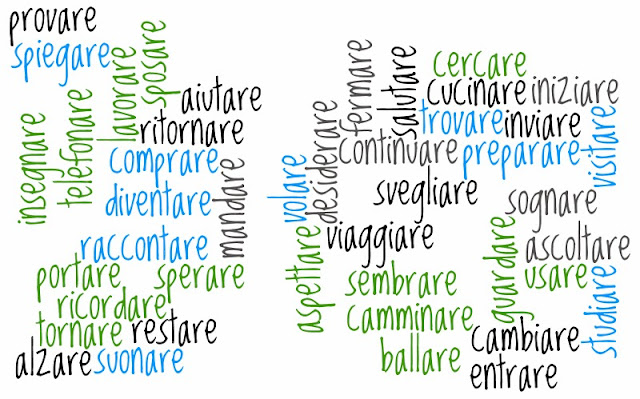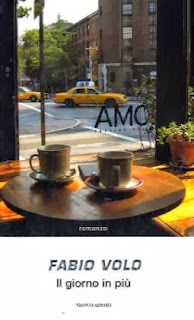As I said in: How Italian verbs work, (Start there if you missed it!) Italian verbs are all about knowing how to identify the stem, and add the appropriate ending for each subject/tense.
Today, we're going to look at the Simple Present Tense and in particular, -ARE verbs:
[We'll cover -ERE and -IRE forms at a later date —Again, review How Italian verbs work in case you're not sure what that means]
To conjugate -ARE verbs in the simple present tense, just drop the -ARE from the infinitive form, and add one of the following endings:
So, if I wanted to conjugate the regular verb: 'parlare' in the first person singular or 'io' it would look like this:
Parlo
I speak
Parlo l'italiano.
I speak Italian.
-Parli l'italiano?
Do you speak Italian?
-Sì, parlo l'italiano.
Yes, I speak Italian.
-Parlano l'italiano?
Do they speak Italian?
-No, parlano l'inglese.
No, they speak English.
Using the above examples as clues, how would you say: "We speak Italian." ? ("We" is "noi", review subject pronouns if needed in: How Italian Verbs Work)
[Highlight below to reveal answer]
Parliamo l'italiano.
Here are some other regular -ARE verbs:
portare - to bring
amare - to love
arrivare - to arrive
trovare - to find
Can you write out the present tense conjugations for each?
↓
I recommend writing out conjugations in 2x3 tables so you can refer back to them easily. Make your own, or use Via Optimae's:
Italian present tense: -ARE verbs Worksheet, available on pages 4 and 5 of the digital Beginner's Workbook*: (with easily printable pages!)
~
You can verify your answers or look up the conjugation for any verb/tense in Word Reference's handy conjugator:
. . . |
| The simple present tense is the first column of the first row labeled "presente." |
Spell-change verbs
There are other verbs that are regular, except when you add the regular endings, it creates weird letter combinations or sounds in Italian. These are called Spell-change verbs.
One example is mangiare. If you simply drop the -ARE as you are supposed to and conjugate, you will get the following forms:
io mangio✓
tu mangii ✗ (why so many i's?, should be mangi)
lui/lei mangia ✓
noi mangiiamo ✗ (again, why so many i's? should be mangiamo)
voi mangiate ✓
loro mangiano ✓
To avoid the "too many i's syndrome", you just drop one of them… A quick spelling change so that you're left with normal forms:
Other Spell-change verbs add an "h" to some of the forms so that the verb maintains its original sound. This is because of how "c" and "g" are pronounced depending on the vowel that follows.
"C" when followed by an "o", "a", or "u" makes a hard sound, like a "k" in English:
to play
"C" when followed by an "i" or an "e" makes a sound like "ch" in English:
When you conjugate 'giocare' in the present tense following the normal rules, you'll get the following:
io gioco✓ (the "c" maintains its "k" sound)
tu gioci ✗ (oops the "c" is like "ch" we need an h! giochi✓)
lui/lei gioca ✓
noi giociamo ✗ (again, our "c" is now "ch" we need an h! giochiamo✓)
voi giocate ✓
loro giocano ✓
The "h" in the above examples tells readers: "Say this like a k!" By adding the "h" we maintain the original sound of the verb. All the correct forms:
Similarly, "g" also makes a "hard" sound (like the "g" in "great) when followed by "a", "o", or "u":
to pay
When followed by a "e" or "i" the "g" becomes "soft" like the "j" in English 'judge'.
just, fair
When you conjugate 'pagare' in the present tense following the normal rules, you'll get the following:
io pago✓ (the "g" maintains its hard sound)
tu pagi ✗ (oops the "g" is now like "j" of judge we need an h! paghi✓)
lui/lei paga ✓
noi pagiamo ✗ (again, our "g" has changed, we need an h! paghiamo✓)
voi pagate ✓
loro pagano ✓
The "h" in the "tu" and "noi" forms tells us to keep the hard sound, so now all the forms have the same "g" sound as the original infinitive:
[Again, you can use either the blank conjugation tables or the conjugation tables plus -ARE present tense review as worksheets, if desired.]
to praise
to be missing
to tie, fasten
That's it for now on -ARE verbs... keep practicing until the forms become natural to you. Use the words in the image at the beginning of the post- they're all regular or spell-change -ARE verbs!
Happy Conjugating!

Ready to move on to the next lesson in this series?
All lessons in the Beginner's Italian series:
(4) Italian present tense: -IRE verbs — CURRENT PAGE
(5) La negazione - Negation
(6) Ogni quanto? Quante volte? (Adverbs of frequency)
(7) C'è & Ci sono (There is & There are)
(6) Ogni quanto? Quante volte? (Adverbs of frequency)
(7) C'è & Ci sono (There is & There are)




![Present tense of parlare (to speak) conjugation table [io parlo, tu parli, lui/lei parla, noi parliamo, voi parlate, loro parlano] by ab for Via Optimae, www.viaoptimae.com Present tense of parlare (to speak) conjugation table [io parlo, tu parli, lui/lei parla, noi parliamo, voi parlate, loro parlano] by ab for Via Optimae, www.viaoptimae.com](https://blogger.googleusercontent.com/img/b/R29vZ2xl/AVvXsEg04yGXA26n5ZbJF95wVagIvz_lLzC93giQ21exRf7PwRQN-z_PIrrWJ2SRfp7ZNNQSyXG7U6786mkj9hypMrEJOxJG9RpjOKUNsM1AnATIh-cLTfpOkVgCOqri_VoREQufT_467NJLeWGd/s1600/PARLARE+present+tense+conjugations+by+Alex+for+viaoptimae.com.png)
![Present simple conjugation table of Mangiare (to eat) [io mangio, tu mangi, lui/lei mangia, noi mangiamo, voi mangiate, loro mangiano] by ab for www.viaoptimae.com Present simple conjugation table of Mangiare (to eat) [io mangio, tu mangi, lui/lei mangia, noi mangiamo, voi mangiate, loro mangiano] by ab for www.viaoptimae.com](https://blogger.googleusercontent.com/img/b/R29vZ2xl/AVvXsEiaFLiZsKH2hEc3G1GI88occj9TOAJqDqFJhjEzuTGD_0ibHCWdqWcipxEeOfHRd99PVunbyEdD9nYvM9jg3Wys8srYwZmGNGICH5hFsb_5uIhxtCLy3823p9WjgXOdD-MwRQinguuhIuxQ/s1600/MANGIARE+present+tense+conjugations+by+ab+for+viaoptimae.com.png)






















+by+Alex+for+didattichiamo.blogspot.jpg)




